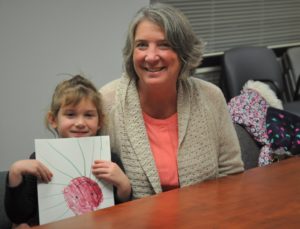Cathy Kincaid was not expecting to be raising a toddler when she reached her fifties, but when she looks at her granddaughter, Maui Mae Denny, her eyes well up with love.
“I wouldn’t want her anywhere else,” she said. “She’s very special to me. She’s my only grandchild. We both have December birthdays. And I will protect her to the day I die.”
Cathy’s worries for Maui started before she was born, having witnessed her son punch Maui’s mother in the stomach while she was pregnant. As Cathy saw the condition of Maui’s life over the next couple of years, she grew more troubled.
Maui came to live with Cathy and her husband in 2018. Both of her parents were incarcerated, and signs of trauma were evident, even in the way she interacted with her grandparents.
“She was so used to the violence that she would stand between us and say, ‘OK, guys, no fighting,’ when we were just talking,” Cathy said.

Cathy Kincaid and her granddaughter, Maui, have benefited from Villa Maria Community Resources Behavioral Health Clinic’s parent-child interaction therapy.
Maui also lashed out when things did not go her way, with Cathy as the usual target. “I’m the spoiling nana, always saying it’s OK,” Cathy said, describing how she struggled to impose discipline.
She knew Maui needed therapy, but had a hard time finding someone who could treat a child her age. They finally connected with Catholic Charities’ Villa Maria Behavioral Health Clinic in Anne Arundel County, where Maui’s therapist suggested they also go through Parent-Child Interaction Therapy together.
Offering options
PCIT is an evidence-based treatment designed to help young children with behavioral problems and their parents or caregivers by supporting healthy interactions and strong relationships. Typically structured in one-hour, weekly sessions, it allows a therapist to coach the child and caregiver as they play together. The caregiver then uses the skills learned in PCIT coaching at home in daily five-minute play sessions with the child, helping to strengthen their attachment while giving the caregiver a chance to offer positive attention and praise for certain behaviors.
Therapists offer PCIT to families with a variety of challenges, including foster parents struggling to form or strengthen their bond with a child; biological parents separated from a child and working toward reunification; multi-child families in which one sibling is endangering another; or families where abuse has been an issue, and coaching is needed to refocus on positive behaviors. In each of these cases, PCIT can be a factor in ensuring families remain intact.
The Villa Maria therapist’s gentle prompts helped Cathy view her own habits differently – particularly her tendency of repeating instructions again and again, without consequences if Maui ignored her. The therapist also recognized that Maui likes to be in charge, and suggested that Cathy could offer choices: “You can pick up your toys, or you can have a time-out.”
“That first time-out was like a dagger in my heart, but we got through it,” Cathy said, and Maui is now more likely to choose the responsible action. “She does not like time-outs!”
Consistency and continued work
The pair graduated from PCIT in summer 2019, and the results have translated into other arenas. Maui’s pre-K teachers were happy to offer similar choices to help steer her behavior, and Cathy laughs as she remembers Maui relaying how she had “held up the wall” at school one day.
“Her teacher told her she could either clean up, or she could stand by herself and hold up the wall at recess,” Cathy said.
The consistency around consequences that PCIT offers had brought structure and a predictable response to behavior challenges across settings in Maui’s life.
Cathy and Maui still face day-to-day battles, such as who is responsible for brushing Maui’s teeth, and Cathy visibly tenses up when she describes custody arrangements with Maui’s parents, or their continuing legal troubles.
But several months after her graduation from PCIT with Maui, the results have been far more than Cathy expected. “I don’t want to pull my hair out anymore,” she joked.
